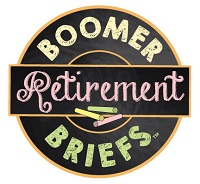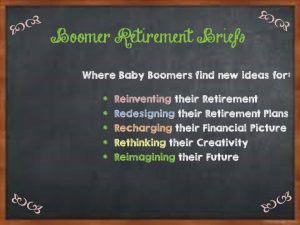To Take or Not to Take? That is the Question.

What would you do if you opened your email today and had a note from Human Resources that you are now eligible for an early retirement package? Would you jump for joy? Feel paralyzed? Think this was an incredible insult?
Many women are facing this real situation, especially in their 50s. All of a sudden, they have to make big life and financial decisions as to whether or not to take an early retirement offer. But, then what? Are they going to retire now in their early 50s? And do what? Can they truly afford to retire at this time?
Interviewing Two Amazing Women
I interviewed two amazing women who found themselves in this situation. They were shocked when they opened the email announcing they were part of an early-retirement “opportunity” at their companies. How did they react and what decisions did they make? You’ll meet Kim and Shelly in this article I wrote for a new retirement publication at TheStreet—yes, the very same media company where Jim Cramer hosts his daily TV and web shows about investing. The editor I work with, Bob Powell, moved to TheStreet to create a new retirement column and conversation. He asked if I would contribute articles about women and retirement and financial matters. I said, “Yes!”
You can read my first article on TheStreet about being 50, fabulous, female…and unemployed. Take a look at the full article (below) as it appeared on December 26, 2017, or you google directly to the article on TheStreet. Bob Powell’s retirement columns and daily news will become a subscription-based resource with videos and webinars, etc. in the near future. For now, you can read my article as well as lots of other important-to-know information at the website.
Take a read and do let me know what you think!
(Reprinted with permission from TheStreet ©2017)
Early Retirement Offer in your 50s: To Take or Not to Take? That is the Question
By Marcia Mantell
Today is a day like all the others. You get to work, grab a cup of coffee, and open your email. There’s a message from HR marked urgent. It’s an offer for you to retire early. Due to your age and years of service, your company has deemed that you are eligible to retire. You must make your decision in the next 30 days, then transition out of gainful employment and into early retirement 90 days after. A huge decision!
Turns out, today is not a day like all the others.
Shelly’s First Reaction to an Early Retirement Package
“No, I’m not going to take the package,” Shelly recalls. That was her first reaction when the large company she worked for sent her the offer to retire early. It was her 53rd birthday and her 25th anniversary working for the company. A gold watch and a letter from the CEO arrived along with a plaque recognizing her 25 years. But the early retirement offer was not exactly a welcome gift. It was completely unexpected and caught her off-guard. She simply wasn’t in that headspace and had never even considered early retirement.
After a good night’s sleep, Shelly woke the day after her unexpected offer to this thought, “What was I thinking? Of course, I’ll take the package!” She put on her new gold watch and realized that this was a sign that her years at this company had come to an end and she was being presented with a graceful exit strategy.
Kim’s First Thoughts
In a similar situation, Kim opened her email to find an offer to retire early as she met the age 55 with 10 years or longer service requirements. She read it, stared at it, reread it, and thought, “Oh, my gosh! I’ve been hit by the lucky stick!” It was her immediate response and almost too good to be true. Kim worked at her company for over 20 years, and while she felt she could continue to work there forever, she also felt boxed in. In this particular moment, when opportunity seemed to come knocking, Kim could sit back and wonder, “Is there more out there somewhere for me?”
How to Make the Decision
As the dust settled, there were many real and practical things to consider before walking out the door of a company. What about the mortgage? Most folks in their mid-50s still carry a mortgage, including Kim and Shelly. How long could they reasonable be out of work and still keep the house? Both women have college tuition payments. Shelly’s youngest is a senior in college. Kim’s youngest is 15 and in high school, so she’s got four years of tuition looming in the near future. What kinds of spending cut-backs or sacrifices would have to be made to their current lifestyles? It might be that vacation plans and home improvements would have to move to the back burner. Who could they turn to for sound advice?
Talking with Trusted Advisors and Grown Kids
As a single mom, Shelly talked to several of “her peeps”, including her trusted advisors and her children. With no second income coming into the household, this decision had the potential to affect her young-adult children significantly. However, she felt confident she could handle the financial side of the decision and still help her daughters. But, what about the career side? After all, she was in her early 50s and employers may not be interested in hiring “older folks”.
So, she sought out professional opinions and advice. Did her professional network think taking an early retirement package was a good idea? Was it reasonable to expect to land a new professional job with comparable salary and benefits? She heard loud and clear from her professional network that she was not too old to start a new career. Just be aware that some compromises may be necessary, especially relocation and a temporarily reduced salary. Was she up for that?
Support from a Wonderful Husband
Kim called her husband after reading the fateful email, asked what he thought about the possibilities. She wanted him to weigh in on the realities of her leaving her vice president job—and the loss of her paycheck. He did a quick back-of-the-envelope assessment and felt confident that they would be fine. She wanted time and space to figure her next steps out. It was a luxury to have such an opportunity. For the past several years, she and her husband had worked to pay down their debt (but still had a mortgage) so they were in a position to take advantage of this opportunity.
This is NOT retirement
When one hears “early retirement package,” it’s easy to think that retirement is on the horizon. But that’s not necessarily so for many of those in their 50s. Considering the level of unpreparedness many Boomers in their 50s are facing, early retirement is not likely. The latest data on the amount of retirement savings is certainly better than in prior years, but still woefully low for most. The average retirement savings is almost $164,000 for those aged 56 to 61. For younger Boomers, ages 50 to 55, the average saved for retirement is about $125,000. (Economic Policy Institute report, 2017) Neither group is in a very comfortable situation for early retirement and may well need the extra dozen or more years of earnings to achieve a comfortable retirement they are planning for.
So, it’s no wonder that one reaction many get from co-workers when they announce they will take the package is surprise. They can’t believe these younger colleagues are retiring. The unspoken question is, “How can you afford to retire so young?” The reality is that most of the 50-somethings will go on to find new jobs. They look at this package not as a pathway into early retirement, but rather as permission to explore new fields, start a new career, and to take some time to reevaluate what they want to do and where they want to go over the next 10 to 20 years.
It’s More Like a Generous Transition Package
Shelly thought of her offer more like a generous transition package. If she didn’t take it, layoffs were likely coming and those future packages might not be so generous. She felt that taking the package was better than rolling the dice. It was a “bird in the hand.” But, there is no word or label for this opportunity. It’s not a layoff, it’s not quitting, it’s not a force-out, and it’s definitely not early retirement. While people were sorry to see her go, it was still awkward, and co-workers felt a sense of betrayal at the company. Shelly didn’t feel that way, and truly believed this was her choice. It was a career decision, not a retirement decision. It was about moving forward to career number two or chapter 2 as many would say.
Could This Package Work Like a Sabbatical?
Kim also found that there was no label, so she looked at this unexpected offer as a sabbatical. Her younger daughter arrived later in life when her career was booming. She didn’t step off the career track at 40, so now had a chance to spend some quality and quantity time with her “baby”. As most professional women acknowledge, she feels she missed out on some of the joys of motherhood and here was a gift of time handed to her.
Now, she’d get her turn to be a full-time mom. Most women don’t get second chances, and she was grabbing this one. Her sabbatical would allow her time with both of her daughters, as well as time for herself to unwind and reprioritize. She would paint (art, not walls), work in her garden, cook and entertain, and enjoy an unrushed cup of coffee in the morning with her husband of 30 years.
Isn’t this too big of a risk to take?
We read every day that Americans haven’t saved enough for retirement and that women have longer life expectancies and longevity. We know health care costs in retirement will be significant and that more women end up single by late in life and may run out of money. In fact, within the 90+ age population, women outweigh men 3-to-1. Said another way, for every 100 women who are 90 or older, there are about 35 men in the same age group. Generally, women will live a longer time in retirement than men. (US Census Bureau, et. al.)
So, why would these women jump at the chance to leave their jobs? Aren’t the risks too high? Would they really find a new job that was going to pay as much as they were earning as a long-time employee at their company? Were they crazy? Sure, people wondered out loud if this was a too risky a move, and some even thought these two ladies were nuts. A few acquaintances were even more critical. And many were quick to advise that they had a good thing going here, so why not just stay?
Working in Corporate America Today Is Not Easy
Most people are not in charge of their careers and have little control over the most important parts of their days. There is no “job security” and it is incumbent upon each person to manage his or her own career to the best of their abilities. It’s too easy to get pigeon-holed into a department or a job function after many years at one company. You are seen as an asset and are a reliable worker. Frankly, it’s often harder on your manager if you were to change roles.
An Opportunity to Better Myself
“Part of my decision was based on the fact that I needed to continue to better myself. Personally, professionally, financially,” remarked Shelly. She wasn’t getting any younger, so why not take this opportunity to breakout of the routine and try something new? Sure, there is some risk involved with leaving, but there was also more risk involved in staying in place. There were no promises if she stayed employed with the long-time company. When she really thought about it, she was simply marking time for layoffs. She was thoughtful about the move, deliberate about how to approach career number two, and the timing was ideal for her.
My Environment Was Too Insular
“I lost sight of the fact that I could be a leader. I had become myopic, my environment was too insular,” Kim shared. It is easy for women to take their areas of expertise for granted after many years. They forget that not everyone can do what they do and that they have so much value. Within a large organization, it’s easy to forget they have worth, expertise, knowledge and leadership. One day they realize they’re just sitting there in the background making things run, keeping the lights on, not feeling the excitement of something new. “No one is going to ring your bell,” Kim reminds us.
The True Gift of an Early Retirement Package Is Time
You have breathing room to think about your options. Make thoughtful decisions. Try new things. It’s a time to reflect on your years of experience, confidence, and capabilities. You are free to network without constraints, and rebuild faith in yourself and your abilities. For both Kim and Shelly, there are no regrets. They feel it was a luxury to have the chance to branch out and find the right next job without the usual financial pressures. They got a chance to be picky about their futures.
Advice for Women in their 50s
Get ready for opportunities that may be coming your way. That was the main message from both Kim and Shelly. If you aren’t already thinking about the possibilities, years in advance, getting an early retirement email may be a bombshell. Use age 50 as your mile-marker. Take a hard look at your financial picture at home and start making some decisions, especially around debt repayment and your mortgage. It takes a long time to fully right your household finances, so the earlier you start, the more prepared you’ll be if and when something happens.
Regardless of your level in an organization, you may be on the receiving end of the latest variety of the pink slip. Will you be prepared to take advantage of your personal sabbatical? Are you gearing up for career number two?
Some Advice from Kim and Shelly Who Walked the Walk in 2017:
- Ask yourself three questions: What do I really want? If I don’t have it all, why not? Have I taken control of my career or have I been content to let someone else choose my job for me?
- Don’t be afraid to take a career leap of faith in your 50s. There is no job security. The risk is small. It won’t be easier to find a job in your 60s.
- The job market is receptive to your energy – not to your age. Prepare an “ageless resume” and focus on what you’ve done in the last 5 – 10 years.
- Be confident. You have experience, skills, knowledge, patience. Not everyone can do what you do. If you’ve raised a family, you now have freedom and wisdom.
- Look at your priorities – family, financial, professional, personal. Where do you want to spend your time and resources now?
- Learn the new technology. Like it or not, social media and technology are here to stay. Demonstrate that you’re tech savvy and current. If you aren’t, take a course or attend webinars that are most helpful to you.
- Build a strong network and reconnect with colleagues. Especially use Linked In to your full advantage.
- Be prepared for a long job search. Many jobs are online, but recruiters and your network are more helpful.
- Take a lateral move or even a step down for the right opportunity. Stepping sideways is not a bad way to go: “lattice vs. ladder” workers.
- Use any resources offered by the employer you are leaving: seminars, resume writing classes, career coach, etc. It’s a whole new world out there.
Final Thoughts
Both ladies acknowledged if you aren’t on a journey where you are in control, you won’t recognize the incredible opportunity that has come your way with an offer for “early retirement”. Become more relevant, have a strong voice, be in control of your life. Modernize your skills. Bring it all to the table and go for what you want should the opportunity arrive next time you open your email.



